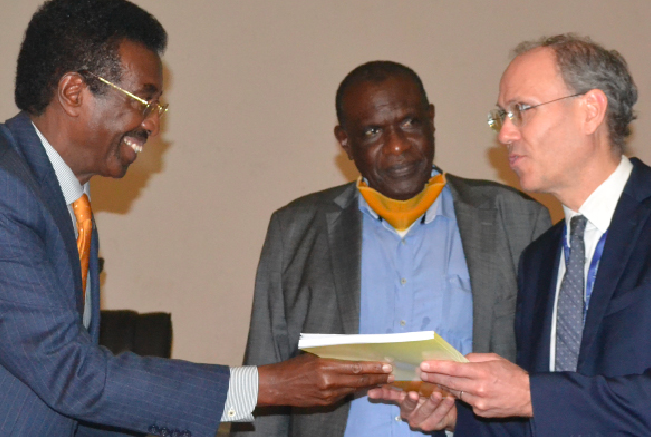Prime
Security agencies decry low funding

Maj Gen (rtd) Jim Muhwezi, the Security minister (left), hands over the Governance and Security programme annual report to Mr Nicolas Gonze, the head of governance and human rights at the EU Delegation in Kampala (right), during the Governance and Security Annual Review Conference in Munyonyo, Kampala, yesterday. Centre is Mr Yunus Kakande, a secretary in the Office of the President. PHOTO/SYLIVIA KATUSHABE
What you need to know:
Officials say they need a budget of Shs24 trillion to work effectively.
- The Minister for Security, Maj Gen (rtd) Jim Muhwezi, however, said the programme will ensure that the limited funds are put to good use.
Officials from the Governance and Security programme have raised concern over the low funding for the programme.
The officials said the available funds for the 2022/2023 Financial Year are not enough to carry out all the activities that the programme was planning to do.
Speaking at the Governance and Security Annual Review Conference in Munyonyo, Kampala yesterday, the senior technical advisor of the governance and security programme, Mr Sam Wairagala, said Parliament only approved Shs6.3 trillion for the programme for the 2022/2023 Financial Year.
He said the money can hardly finance even 50 percent of their demands.
“For us to work effectively, we had a budget of Shs24 trillion as a governance and security programme but what government is able to give is Shs6.3 trillion. You can see that we are operating at a quarter of what we would require for our functions,” Mr Wairagala said.
He said they are looking into developing partnerships with other countries to increase funding to the programme.
Some of the activities that the programme hopes to undertake include the construction of police stations in different parts of the country, addressing congestion in prisons, facilitating zonal industrial parks and skilling centres, among others.
“One of the challenges in the prisons is congestion, where the prisons of a capacity of 19,000 are now housing 74,000 inmates. Having a facility carrying three times its carrying capacity is a big challenge in terms of health but also in terms of security,” Mr Wairagala said.
The Minister for Security, Maj Gen (rtd) Jim Muhwezi, however, said the programme will ensure that the limited funds are put to good use.
“Most of the agencies in this blanket of governance and security are patriots and revolutionists. We are going to continue working whether we have money or not but we have to be frugal with the Shs6 trillion to make sure that we don’t compromise on service delivery or security,” Maj Gen Muhwezi said.
Regarding the security of the country, Maj Gen Muhwezi urged the public to remain calm, saying the Uganda People’s Defence Forces (UPDF) will contain the Allied Democratic Forces (ADF) rebels threat.
“The recent incident in Ntoroko was a diversionary move. Little did they know that the UPDF is strong and gave them a bloody nose,” Maj Gen Muhwezi said.
The Prime Minister, Ms Robinah Nabbanja, in a statement read for her by Maj Gen Muhwezi, said with the security challenges in the Democratic Republic of Congo, rebels may cross into Uganda. She urged the public to remain vigilant.
“We must continue investing in security to ensure a high combat readiness at all times to manage security at all times,” Ms Nabbanja said.
She cautioned leaders against engaging in corruption, which she said is eating up some government departments.
About the programme
The Governance and Security programme brings together 33 government agencies responsible for upholding the rule of law, ensuring security, maintaining law and order, public policy and administration of justice.
The agencies include Uganda Police Force, Ministry of Internal Affairs, Ministry of Defence and Veteran Affairs, Ministry of Public Service, Uganda Prisons Service, Ministry of Foreign Affairs, among others.
The programme is who aimed at promoting human rights, accountability and transparency and also contributes to the National Development Plan III.




